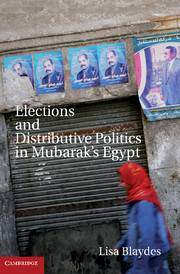Book contents
- Frontmatter
- Contents
- List of Figures
- List of Tables
- Acknowledgments
- 1 Introduction
- 2 Political and Economic Change since 1952
- 3 Elections and Elite Management
- 4 The Politics of Infrastructure Provision
- 5 Electoral Budget Cycles and Economic Opportunism
- 6 Vote Buying, Turnout, and Spoiled Ballots
- 7 Elections and Elite Corruption
- 8 Elections and the Muslim Brotherhood
- 9 Liberal Intellectuals and the Demand for Democratic Change
- 10 Foreign Pressure and Institutional Change
- 11 Egypt in Comparative Perspective
- 12 Conclusion
- Bibliography
- Index
5 - Electoral Budget Cycles and Economic Opportunism
Published online by Cambridge University Press: 04 February 2011
- Frontmatter
- Contents
- List of Figures
- List of Tables
- Acknowledgments
- 1 Introduction
- 2 Political and Economic Change since 1952
- 3 Elections and Elite Management
- 4 The Politics of Infrastructure Provision
- 5 Electoral Budget Cycles and Economic Opportunism
- 6 Vote Buying, Turnout, and Spoiled Ballots
- 7 Elections and Elite Corruption
- 8 Elections and the Muslim Brotherhood
- 9 Liberal Intellectuals and the Demand for Democratic Change
- 10 Foreign Pressure and Institutional Change
- 11 Egypt in Comparative Perspective
- 12 Conclusion
- Bibliography
- Index
Summary
Do authoritarian regimes manipulate fiscal and monetary policy in the runup to elections? Whereas most of the academic literature on electoral budget cycles has focused on democratic countries (with mixed empirical results), researchers are now turning their attention to the existence of electoral budget cycles in autocratic countries, whose highly centralized processes for economic policy making and fewer independent economic institutions make them prime candidates to exhibit such patterns. This chapter investigates the existence of opportunistic electoral budget cycles in Egypt. Although most research on electoral budget cycles focuses exclusively on econometric analysis of economic data, this chapter also includes a detailed discussion of the specific mechanisms used by the regime to court citizens. This information reveals particular patterns and strategies for orchestrating economic incentives.
In Egypt, the main budgetary manipulations take place to benefit state employees, farmers, and the urban poor. These preelectoral economic changes provide small improvements in salaries and services to a fairly broad swath of the populace to create the impression of gradual improvement in economic conditions for these beneficiaries. From an econometric perspective, Egypt's electoral budget cycle is apparent in five areas: a) inflation is higher in election years, b) calorie consumption is higher in election years, c) total reserves drop in the six months prior to the election, d) claims against the government increase following elections, and e) exchange rate devaluations tend to take place after elections.
- Type
- Chapter
- Information
- Elections and Distributive Politics in Mubarak’s Egypt , pp. 77 - 99Publisher: Cambridge University PressPrint publication year: 2010
- 1
- Cited by

